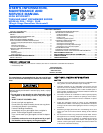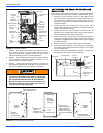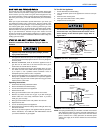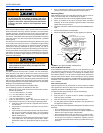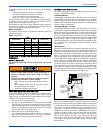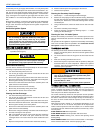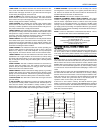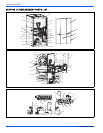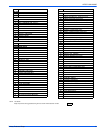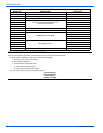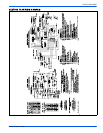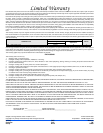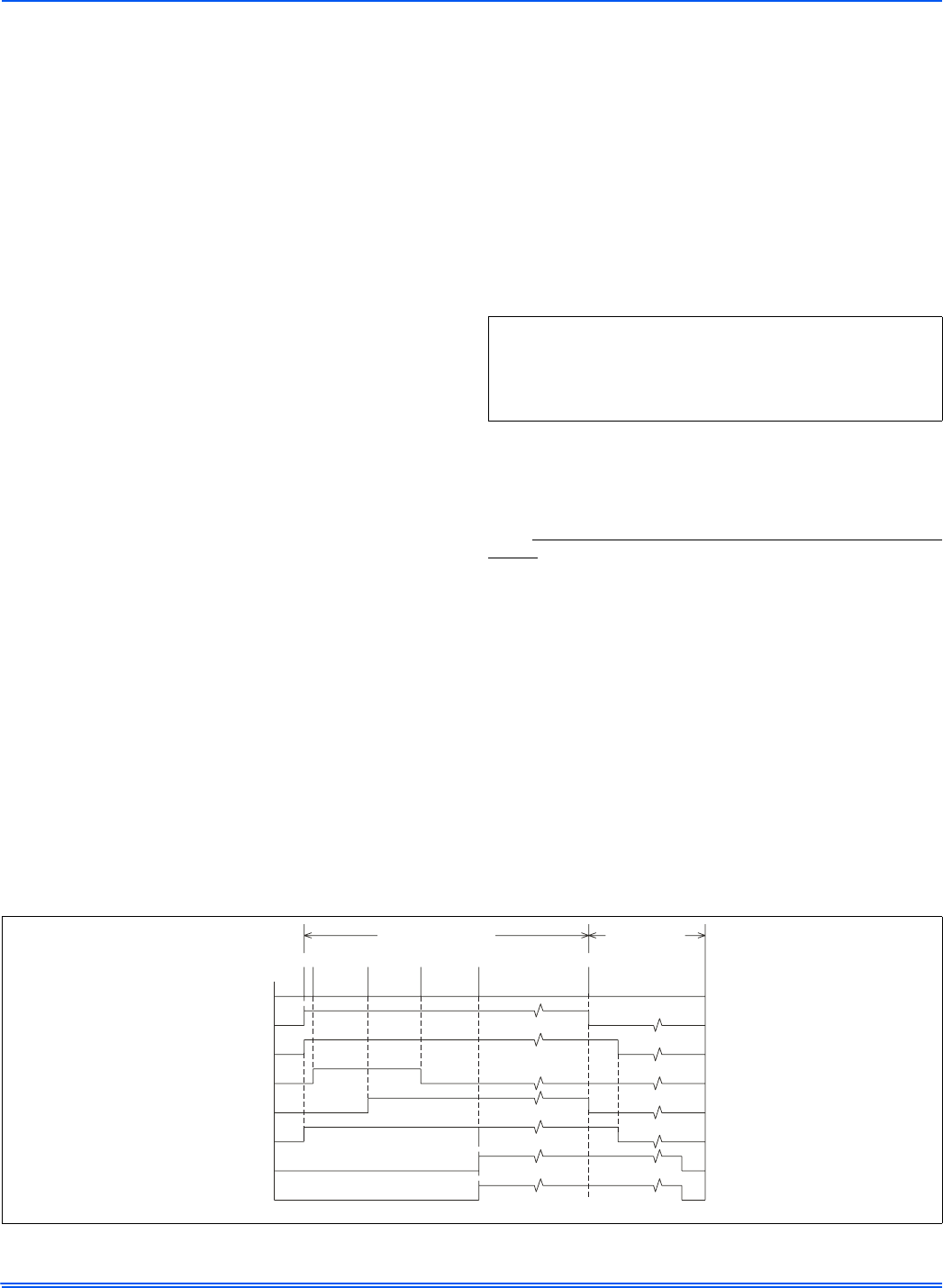
127237-UUM-A-0605
Unitary Products Group 7
1 RED FLASH: This indicates that flame was sensed when there was
not a call for heat. With this fault code the control will turn on both the
inducer motor and supply air blower. A gas valve that leaks through or
is slow closing would typically cause this fault.
2 RED FLASHES: This indicates that the normally open pressure
switch contacts are stuck in the closed position. The control confirms
these contacts are open at the beginning of each heat cycle. This would
indicate a faulty pressure switch or miswiring.
3 RED FLASHES: This indicates the normally open pressure switch
contact did not close after the inducer was energized. This could be
caused by a number of problems: faulty inducer, blocked vent pipe, bro-
ken pressure switch hose or faulty pressure switch.
4 RED FLASHES: This indicates that a primary or auxiliary limit switch
has opened its normally closed contacts. With this fault code the control
will operate the supply air blower and inducer. This condition may be
caused by: dirty filter, improperly sized duct system, incorrect blower
speed setting, incorrect firing rate or faulty blower motor.
5 RED FLASHES: This fault is indicated if the normally closed contacts
in the rollout switch opens. The rollout control is manually reset. If it has
opened, check for proper combustion air, proper inducer operation, and
primary heat exchanger failure or burner problem. Be sure to reset the
switch after correcting the failure condition.
6 RED FLASHES: This indicates that after the unit was operating, the
pressure switch opened 4 times during the call for heat. If the main
blower is in a “Delay on” mode it will complete it, and any subsequent
delay off period. The furnace will lock out for one hour and then restart.
7 RED FLASHES: This fault code indicates that the flame could not be
established. This no-light condition occurred 3 times (2 retries) during
the call for heat before locking out. Low gas pressure, faulty gas valve,
dirty or faulty flame sensor, faulty hot surface ignitor or burner problem
may cause this.
8 RED FLASHES: This fault is indicated if the flame is lost 5 times (4
recycles) during the heating cycle. This could be caused by low gas
pressure, dirty or faulty flame sensor or faulty gas valve. The furnace
will lock out for one hour and then restart.
9 RED FLASHES: Indicates reversed line voltage polarity or grounding
problem. Both heating and cooling operations will be affected. Check
polarity at furnace and branch. Check furnace grounding including the
transformer ground. Check that flame probe is not shorted to chassis.
10 RED FLASHES: Gas flow with no call for heat. Check gas valve and
gas valve wiring.
11 RED FLASHES: This indicates that a primary or auxiliary limit switch
has opened its normally-closed contacts and has remained open for
more than five minutes. This condition is usually caused by a failed
blower motor or blower wheel. Cycle power (24 VAC) to the control to
reset the hard lockout condition after correcting the failure condition.
4 AMBER FLASHES: Y present with no G call. Normally, both Y and G
are energized on a call for cooling. If a Y signal is present with no G sig-
nal, check to see that the wire from the G terminal on the board to the
wall thermostat has not broken or disconnected.
STEADY ON RED: Control failure. Replace control board.
60-MINUTE AUTOMATIC RESET FROM LOCKOUT: This control
includes a “watchdog” type circuit that will reset from a lockout condition
after 60 minutes. Operational faults 6,7,8 will be reset. This provides
protection to an unoccupied structure if a temporary condition exists
causing a furnace malfunction. An example would be a low incoming
gas supply pressure preventing unit operation. When the gas pressure
is restored, at some point the “watchdog” would restart the unit and pro-
vide heat for the house.
NOTE: If a flame is detected the control flashes the LED for 1/8 of a
second and then enters a flame stabilization period.
DIAGNOSTIC FAULT CODE STORAGE AND
RETRIEVAL
The control in this furnace is equipped with memory that will store up to
five error codes to allow a service technician to diagnose problems
more easily. This memory will be retained even is power to the furnace
is lost. This feature should only be used by a qualified service tech-
nician.
The control stores up to five separate error codes. If more than five
error codes have occurred since the last reset, only the five most recent
will be retained. The furnace control board has a button, labeled "LAST
ERROR" that is used to retrieve error codes. This function will only work
if there are no active thermostat signals. So any call for heating, cooling
or continuous fan must be terminated before attempting to retrieve error
codes.
To retrieve the error codes, push the LAST ERROR button. The LED on
the control will then flash the error codes that are in memory, starting
with the most recent. There will be a two-second pause between each
flash code. After the error codes have all been displayed, the LED will
resume the normal slow green flash after a five second pause. To
repeat the series of error codes, push the button again.
If there are no error codes in memory, the LED will flash two green
flashes. To clear the memory, push the LAST ERROR button and hold it
for more than five seconds. The LED will flash three green flashes when
the memory has been cleared, then will resume the normal slow green
flash after a five-second pause.
IGNITION CONTROL (P/N 031-01972-000)
Normal flame sense current is approximately
3.7 microamps DC (µa)
Low flame signal warning starts at 1.5 microamps.
Low flame signal control lockout point is
0.9 microamps DC (µa)
FIGURE 9: Furnace Control Event Schedule
Thermostat Calling for Heat
Thermostat Satisfied
(Seconds)
THERMOSTAT
INDUCER
IGNITOR
MAIN VALVE
HUMIDIFIER
ELECTRONIC
AIR CLEANER
CIRCULATING
BLOWER
OFF
OFF
OFF
OFF
OFF
OFF
OFF
ON
ON
ON
ON
OFF
OFF
OFF
OFF
ON
ON
ON
OFF
OFF
OFF
OFF
OFF
OFF
OFF
15 Sec.
Post
Purge
Fan on Delay
30 Seconds
0
2
17 22
52
0
60, 90, 120, 180 SEC.
Selectable Fan Off Delay



